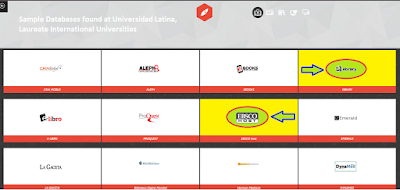Photo
taken from http://www.niemanlab.org/tag/geolocation/
Finding Relevant Academic Literature
By Prof. Jonathan Acuña-Solano
School of English
Faculty of Social Sciences
Universidad Latina de Costa Rica
Friday, February 19, 2016
Post 212
“The first step in the research process is determining
an area in need of exploration” (Laureate Education, Inc., 2016) . No doubt that all
of us teaching professionals get to be bewildered by phenomena (behaviors, test
items yielding unexpected results, difficulty in the instructional design of
learning tasks for students, etc.) that can be easily spotted within the four
walls of our classrooms. Any of these areas linked to education are the ones
“in need of exploration” to really know what the reasons underlying the
“problem” can be and what informed actions can be taken to profit from it, to
make corrective changes, and so on.
“In
academic research,” the exploration process “is often accomplished by reviewing
the literature” (Laureate Education, Inc., 2016) connected to the
areas in need of inspection for better comprehension. “However, locating
literature that is relevant, scholarly, and current can be a challenging task” (Laureate Education, Inc., 2016) . The literature
review can indeed start with trying to find trustful resources on the web, but
usually a research project cannot only rely on these sources. The search for
present articles dealing with one’s topic of research can become a bit of a
problem if databases are not accessed and used in one’s project.
“As a
researcher, you must be able to know where to find information and how to
examine sources for relevancy” (Laureate Education, Inc., 2016) . “Research databases
that are retrieved on the World Wide Web are generally non-fee based, lack
in-depth indexing, and do not index proprietary resources” (Research Databases, 2015) . An example for this
kind of database is Google Scholar that, though is quite helpful to spot
information on the Internet, it often leaves out articles, or books’ pages
since the researcher is meant to access that information by means of a
subscription. “Subscription or commercial database are more refined with
various types of indexing features, searching capabilities, and help guides” (Research Databases, 2015) .
Understanding
that “research databases are organized collections of computerized information
or data such as periodical articles, books, graphics and multimedia that can be
searched to retrieve information” (Research Databases, 2015) , at Universidad
Latina de Costa Rica, where I currently work, faculty members and university
students have access to 16 different types. For the sake of research in my
field of teaching, which is education and ELT (English Language Teaching), some
of them are quite good, such as the ones highlighted in the following
screenshot: The ones that stand out for us interested in education are eLibrary
and EBSCO Host.
Due to the fact that “a Research Database contains
reliable, accurate and authoritative information gathered together in one
place, and provides convenient and quick access to the information” (Database FAQs - Why use a Research Datababase, n.d.) , eLibrary and EBSCO
Host are great choices for researchers in education.
At this
point of my academic, serving as an example of my current scholarly life, I am
interested in finding a bit more regarding peer feedback. My research topic for
my following project is what the perception of students is when it comes to
peer feedback, its relevance to their language and public speaking development,
and the comfortability of each learner to coach a partner instead of the
instructor. All of these grounded on the fact that this feedback is provided to
peers via the university Moodle platform after submitting their mini speeches
previously video recorded.
By means
of EBSCO Host I found an article in the journal of Assessment & Evaluation in Higher Education, 2014 Vol. 39, No. 1,
102/122 entitled Rethinking feedback
practices in higher education: a peer review perspective. And by means of
eLibrary I was able to spot a book edited by Reitbauer, M., Campbell, N., &
Mercer, S., whose name is Feedback
Matters, Current Feedback Practices in the EFL Classroom. In addition, the
reason why these two pieces of data have been chosen is connected to
“literature that is relevant, scholarly, and current.”
References
Database FAQs - Why use a Research
Datababase. (n.d.). Retrieved from Scituate Town Library:
http://www.scituatetownlibrary.org/reference_db_faq.html
Laureate Education, Inc. (2016). Academic
Research. Retrieved from Faculty Development:
https://lnps.elearning.laureate.net/
Research Databases. (2015, December 8). Retrieved
from Prince George's Community College:
http://pgcc.libguides.com/c.php?g=60038&p=385667











Post a Comment